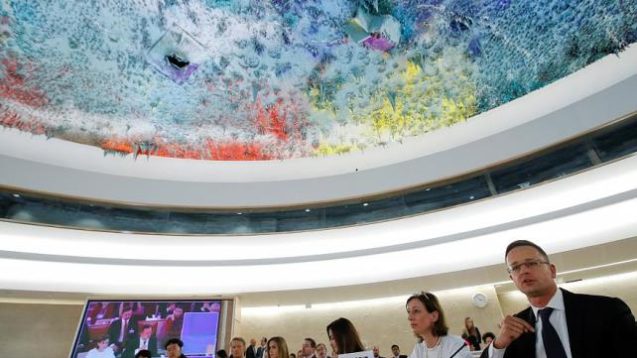New Delhi: The United Nations Human Rights Council has adopted the draft resolution presented by Pakistan on countering religious hatred in the aftermath of the Quran-burning episode in Sweden, with India voting in favour of the resolution.
The draft resolution L.23 was orally revised once tabled. It is titled ‘Countering religious hatred constituting incitement to discrimination, hostility or violence’.
In late June, a man had torn and burned a copy of the Quran outside Swedish capital Stockholm’s central mosque. He was charged with agitating against an ethnic or national group by Swedish police, Reuters had reported.
The US, and crucially Turkey, whose backing Sweden seeks in its bid to join NATO, had both criticised the incident.
The Organisation of Islamic Cooperation, comprising 57 countries, had called the incident “offensive, disrespectful and a clear act of provocation” that incites hatred and constitutes a human rights violation, according to another Reuters report.
Pakistan, on behalf of the OIC, had presented the draft resolution which condemned “recurring acts of the public burning” of the Quran in “some European and other countries”.
Despite Western diplomats’ opposition to the resolution, 19 OIC countries are voting members of the 47-member human rights council, and other states such as China had aligned with their draft resolution.
Among the 12 countries that voted against this resolution are the US, the UK, France Belgium, Germany, Romania, Lithuania, Costa Rica and Finland.
Nepal, Paraguay, Georgia, Benin, Chile, Honduras, and Mexico abstained.
Twenty-eight countries, including India, China, South Africa, Vietnam, and Ukraine, voted for it.
India did not explain its vote on Wednesday, but it made a statement during the debate on July 11. However, the statement made no explicit reference to the Sweden incident. India has also not issued any separate reaction to the Quran burning, and there was no direct condemnation.
India had stated that there was an increase in “phobias” against all religions and did not mention Islam by name. “In various regions of the world, we have witnessed defacement and destruction of temples and idols, glorification of desecration of idols, violation of gurudwara premises, massacre of Sikh pilgrims and numerous other acts of religious intolerance. There is a need for the international community to recognize the instances of intolerance, prejudice, phobia, and violence against followers of all religions and work together to eliminate them,” said the Indian statement.
Further, India claimed that its tolerance was based on its “civilizational ethos”, with guarantees inscribed in the Constitution. “India’s civilizational emphasis on Vasudhaiva Kutumbakam, that is ‘the World is one family’ provides the basis for the elimination of all kinds of religious hatred, discrimination and intolerance directed against followers of all religions. It is high time that all members States join hands to build a culture of equal respect for all religions and their peaceful coexistence,” said the Indian representative.
After the vote, US Michele Taylor said that if there had been more time, a consensus could have been reached. “Unfortunately our concerns were not taken seriously,” she said, as per AFP. “I’m truly heartbroken that this council was unable to speak with a unanimous voice today in condemning what we all agree are deplorable acts of anti-Muslim hatred while also respecting freedom of expression.”
Pakistan’s Permanent Representative to the U.N. in Geneva, Khalil Hasmi, accused the West of “lip service” to their commitment to prevent religious hatred. “The opposition of a few in the room has emanated from their unwillingness to condemn the public desecration of the Holy Koran or any other religious book,” he said, as quoted by Reuters.
“They lack political, legal and moral courage to condemn this act, and it was the minimum that the Council could have expected from them,” added Hashmi.__The Wire





